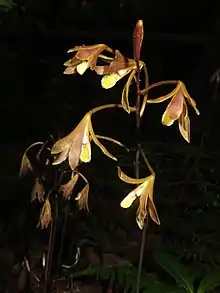Lecanorchis
Lecanorchis is a genus of orchids (family Orchidaceae) belonging to the subfamily Vanilloideae.
| Lecanorchis | |
|---|---|
 | |
| Lecanorchis japonica | |
| Scientific classification | |
| Kingdom: | Plantae |
| Clade: | Tracheophytes |
| Clade: | Angiosperms |
| Clade: | Monocots |
| Order: | Asparagales |
| Family: | Orchidaceae |
| Subfamily: | Vanilloideae |
| Tribe: | Vanilleae |
| Genus: | Lecanorchis Blume |
| Type species | |
| Lecanorchis japonica Blume, Mus. Bot. 2: 188 (1856). | |
The scientific name is derived from the Greek words lekane (basin) and orchis (orchid).
They occur in mountain forest of the Himalayas, China, Japan, Korea, Southeast Asia, and New Guinea at altitudes of 300–1,500 metres (980–4,920 ft).[1][2]
They are terrestrial, leafless myco-heterotrophs (formerly called saprophytes). They produce numerous, long, thick, horizontal roots under a short rhizome. The erect, dark, branched or unbranched stems are thin and brittle. They bear few to many dull brown, purple, yellow or green flowers with a somewhat brighter lip. The lip is about of equal length to the sepals and is covered with dense, yellow hair.
Characteristics for this species are:
- A calyculus, a cup-like structure formed from a group of small bracts, is present.
- The erect gynostemium (the fused stamen and pistil) is elongate.
Lecanorchis is related to Clematepistephium and Eriaxis,[3] both endemic to New Caledonia.
Species
Species accepted as of June 2014:[1]
- Lecanorchis amethystea Y.Sawa, Fukunaga & S.Sawa (2006) (Japan, Taiwan)
- Lecanorchis betongensis Suddee & H.A.Pedersen (2011) (Thailand)
- Lecanorchis bicarinata Schltr. (1922) (New Guinea)
- Lecanorchis brachycarpa Ohwi. (1938) (Ryukyu Islands and Taiwan)
- Lecanorchis ciliolata J.J.Sm. (1929) (New Guinea)
- Lecanorchis flavicans Fukuy. (1942) (Ryukyu Islands)(Status : threatened)
- Lecanorchis japonica Blume (1856) (Japan, Korea, Taiwan, Fujian, Hunan)
- Lecanorchis javanica Blume (1856) (Java, Taiwan, Thailand, Vietnam, Malaysia, Philippines, New Guinea)
- Lecanorchis latens T.P.Lin & W.M.Lin (2011) (Taiwan)
- Lecanorchis kiusiana Tuyama (1955) (Korea, Japan)
- Lecanorchis malaccensis Ridl. (1893) (Thailand, Vietnam, Borneo, Malaysia, Sumatra)
- Lecanorchis multiflora J.J.Sm. (1918) (Thailand, Yunnan, Borneo, Malaysia, Sumatra, Java)
- Lecanorchis neglecta Schltr. (1911) (New Guinea)
- Lecanorchis nigricans Honda (1931) (Japan, Taiwan, Fujian, Thailand, Ryukyu Islands)
- Lecanorchis seidenfadenii Szlach. & Mytnik (2000) (Malaysia)
- Lecanorchis sikkimensis N.Pearce & P.J.Cribb (1999) (Sikkim, Bhutan)
- Lecanorchis subpelorica T.C.Hsu & S.W.Chung, (2010) (Taiwan)
- Lecanorchis suginoana (Tuyama) Seriz. (2005)
- Lecanorchis thalassica T.P.Lin (1987) (Taiwan)
- Lecanorchis vietnamica Aver. (2005), Vietnam
- Lecanorchis virella T.Hashim. (1989) (Japan, Taiwan)
A new species, Lecanorchis tabugawaensis was described in 2016.[4]
References
- Kew World Checklist of Selected Plant Families
- Flora of China v 25 p 171, 盂兰属 yu lan shu, Lecanorchis Blume, Mus. Bot. 2: 188. 1856
- Cameron, K. M. (2009) On the Value of Nuclear and Mitochondrial Gene Sequences for Reconstructing the Phylogeny of Vanilloid Orchids (Vanilloideae, Orchidaceae). Annals of Botany 104 (3): 377–85.
- Suetsugu, Kenji; Fukunaga, Hirokazu (2016-03-11). "Lecanorchis tabugawaensis (Orchidaceae, Vanilloideae), a new mycoheterotrophic plant from Yakushima Island, Japan". PhytoKeys. 73. doi:10.3897/phytokeys.73.10019. ISSN 1314-2003. PMC 5109904. PMID 27872560.
- Blume, C. L. von (1856) Museum Botanicum 2: 188.
- Pridgeon, A.M., Cribb, P.J., Chase, M.C. & Rasmussen, F.N. (2003) Genera Orchidacearum 3: 316 ff. Oxford University Press.
- Orchid Research Newsletter 47 (January 2006) - Royal Botanical Gardens, Kew.
- Dariusz L. Szlachetko & Joanna Mytnik - Lecanorchis seidenfadeni (Orchidaceae, Vanilloideae), a new orchid species from Malaya ; An.Bot.Fennici 37;227-230 (on line : )
External links
 Data related to Lecanorchis at Wikispecies
Data related to Lecanorchis at Wikispecies